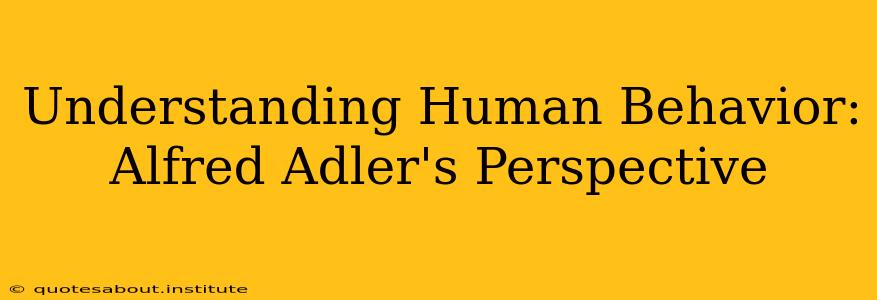Alfred Adler, a prominent figure in psychology, offered a unique perspective on human behavior, diverging significantly from his contemporaries like Sigmund Freud. Instead of focusing on the unconscious and psychosexual development, Adler emphasized the conscious striving for superiority and the importance of social context in shaping personality. This article delves into Adler's key concepts, exploring how his theories offer a valuable framework for understanding human motivation and behavior.
What is Adlerian Psychology?
Adlerian psychology, also known as individual psychology, posits that humans are inherently social beings driven by a fundamental desire for belonging and significance. Unlike Freud's emphasis on past traumas, Adler believed that our present goals and future aspirations play a more critical role in shaping our behavior. He argued that individuals develop a unique "style of life" – a consistent pattern of behaviors, thoughts, and feelings – that guides their actions throughout life. This style of life is shaped by early childhood experiences, but it's not deterministic; individuals have the capacity to consciously choose and modify their path.
What are the Key Concepts in Adlerian Psychology?
Several core concepts underpin Adler's theory. Let's explore some of the most important:
Striving for Superiority:
This is arguably Adler's most central concept. It's not about dominance or superiority over others, but rather a striving for self-improvement, competence, and mastery. This innate drive pushes individuals to overcome their perceived inferiority and achieve their full potential. This striving motivates us to learn, grow, and contribute to society. It's the engine driving personal growth and development.
Inferiority Feelings:
These feelings aren't necessarily negative; they are a natural part of human experience, arising from our inherent limitations and vulnerabilities. Adler believed that these feelings, when appropriately managed, can fuel our striving for superiority. However, unhealthy coping mechanisms can lead to feelings of inadequacy and hinder personal growth.
Style of Life:
This refers to an individual's unique and consistent pattern of interacting with the world. It encompasses their beliefs, values, goals, and strategies for achieving their goals. The style of life is formed in early childhood, influenced by family dynamics, birth order, and early social experiences, but it is not immutable; it can be modified through conscious effort and therapy.
Social Interest:
Adler highlighted the significance of social interest, which he considered the cornerstone of mental health. Social interest refers to a feeling of belonging and connection with humanity, a desire to contribute to the well-being of others and society as a whole. A strong social interest fosters cooperation, empathy, and a sense of community.
Fictional Finalism:
This concept refers to the guiding beliefs and expectations that shape our behavior, even if they aren't grounded in reality. These "fictions" are personal interpretations of the world, providing a sense of direction and purpose. They can be positive and constructive, driving us towards achievement, or they can be limiting and self-defeating.
How Does Adlerian Psychology Differ from Other Theories?
Adlerian psychology distinguishes itself from other schools of thought, such as Freudian psychoanalysis, by its emphasis on conscious motivation, the importance of social factors, and the inherent drive for self-improvement. Unlike Freud's focus on past trauma, Adler stressed the present and future, emphasizing an individual's capacity for growth and change.
What are the Applications of Adlerian Psychology?
Adlerian principles have broad applications in various fields:
- Therapy: Adlerian therapy helps individuals understand their unique style of life, identify limiting beliefs, and develop more adaptive coping mechanisms.
- Education: Understanding students' individual styles of life can inform teaching methods and create a more supportive learning environment.
- Parenting: Adlerian principles offer valuable insights into fostering children's social interest and encouraging healthy development.
- Organizational settings: Applying Adlerian concepts can enhance teamwork, communication, and overall workplace harmony.
How Can I Learn More About Adlerian Psychology?
Numerous resources exist for delving deeper into Adlerian psychology. You can explore books by and about Alfred Adler, as well as articles and websites dedicated to his theories and applications. Seeking out a therapist specializing in Adlerian therapy can provide a personalized understanding of these concepts and their relevance to your life.
This overview provides a foundational understanding of Alfred Adler's perspective on human behavior. His ideas remain highly relevant today, offering valuable insights into personal growth, interpersonal relationships, and the pursuit of a meaningful life. By understanding the interplay of striving for superiority, social interest, and the unique style of life, we can gain a deeper appreciation for the complexity and richness of human experience.

